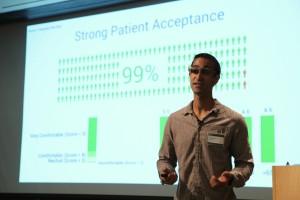Virtual reality garners frequent attention in news circles for its potential to reinvent the games industry. What is lesser known is that this technology has experimental applications far beyond entertainment. Virtual reality stands poised to innovate the field of healthcare education.
Virtual reality garners frequent attention in news circles for its potential to reinvent the games industry. What is lesser known is that this technology has experimental applications far beyond entertainment. Virtual reality stands poised to innovate the field of healthcare education.
VR is a computer generated simulation of an environment, model, or image that is typically viewed through a headset. Participants can interact with the simulations through analog or gesture controls. In the medical field, VR scenarios would place participants in a variety of scenarios that permit students or professionals to interact and practice their skills.
It is this kind of outside-the-box thinking that could change the way medical professionals learn and train. Potential applications are being explored in dentistry, medicine, nursing, surgery, and various treatments and therapies. The technology shows promise particularly as diagnostic and learning tool, best evidenced by the Microsoft HoloLens. Several studies are investigating the efficacy of implementing VR alongside traditional medical tests to diagnose conditions and disorders.
Military services around the world have taken an interest in the technology to see how it can be used to rehabilitate wounded soldiers. This stands in contrast to the VR combat training simulations the military already uses. It’s one of many cutting edge rehabilitation technologies that are pioneering the recovery process. The technology has been used to help patients with traumatic brain injuries and spinal injuries.
While it is no substitute for real world experience, virtual reality holds the potential for medical personnel to interact in controlled training scenarios and gain experience that might otherwise have been impossible to gain otherwise. After rigorous testing this technology could be incorporated in professional training programs for all types of medical professionals.
The value of training for complex procedures without risking the lives of actual patients cannot be overstated. This opportunity allows medical professionals to prepare for rare medical scenarios, gaining experience they’re unlikely to get any other way. Many students learn best in a hands on environment, making this facet of direct participation especially important.
Another advantage can be found in geographic proximity. Virtual reality does not require students to live near or commute to a specific location. Using their headset and other necessary VR equipment, the student can participate from anywhere with an internet connection. This virtual element engages students by allowing them all to participate in a convenient and risk-free environment. The format provides opportunities to repetitively train the same procedure with a realistic visual feedback component that reinforces memory. An article in Forbes titled, “How Virtual Reality May Change Medical Education And Save Lives,” highlights this aspect by noting the educational opportunities virtual reality provides.
Simulation can be valuable in residency programs and other types of hospital training programs. This technology will be important going forward because it makes lifesaving training and education available to a wider audience. It allows medical professionals of all specialties to practice their skills in a safe environment. Virtual reality has the power to teach valuable life skills without the limitations of the real world.








_9_2_1-250x220.jpg)
